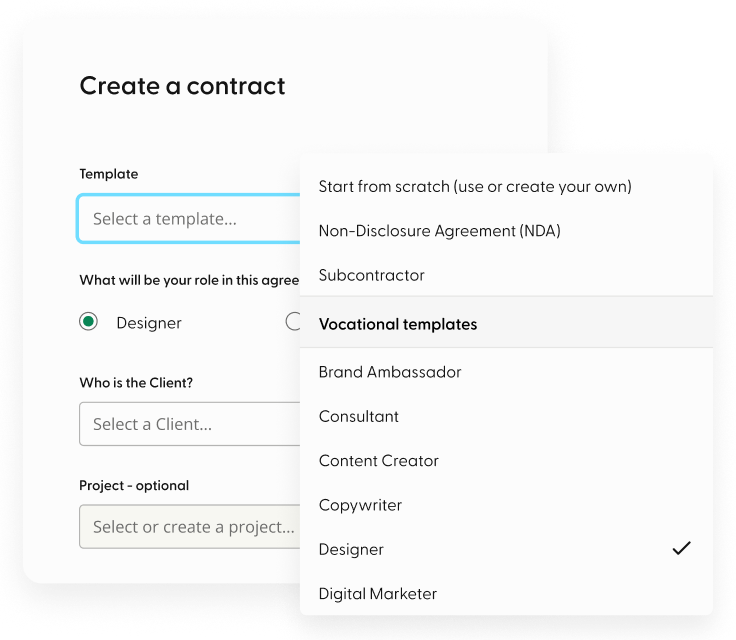If you're a freelancer, it's important to understand the legal implications of a non-compete agreement. A non-compete agreement is a legally binding document between an employee and an employer that specifies the employee will not compete with the employer in their business space for a certain period of time.
In this article, you’ll find everything you need to know about a non-compete agreement template.
What Is a Standard Non-Compete Agreement?
In the freelancing world, a standard non-compete agreement is a legally binding document that freelancers and clients use to outline the conditions where the freelancer agrees not to compete with the client's business. The agreement helps protect the client's interests by preventing the freelancer from offering similar services to the client's competitors or starting a similar business during or after their working relationship. It ensures fairness and helps maintain a good working relationship between freelancers and their clients.
When drafting a non-compete agreement, it's important for everyone involved to understand and agree on the conditions. The agreement should explain in detail what actions and business practices are not allowed, and clearly define what counts as competition. It should also specify how long a freelancer must wait before working with competing businesses. Everyone should read the document carefully before signing it to avoid misunderstandings or problems later on.
When to Use a Non-Compete Agreement
As a freelancer, you may encounter situations where clients require a non-compete agreement. These agreements are put in place to protect the interests of the client and ensure that the work you do for them remains exclusive.
When you enter into a non-compete agreement as a freelancer, it means that you agree not to provide similar services to their competitors or directly compete against them during or after the project engagement. This safeguards the client's business, confidential information, and client relationships. By respecting the non-compete agreement, you demonstrate professionalism and help maintain trust with your clients.
It's important to carefully review and understand the terms of the agreement before signing, as it may impact your ability to take on certain projects or work within a specific industry for a certain period of time.
How Do I Write a Non-Compete Agreement?
Writing a non-compete agreement involves careful consideration of various factors. While most non-compete agreements follow a general framework, it's crucial to consult with a legal professional to make sure that the agreement aligns with the specific laws and regulations of your jurisdiction.
Here are some key elements to include when creating a non-compete agreement:
Introduction
Begin the agreement with a clear statement of intent, identifying the parties involved (employer and employee/contractor) and their roles.
Definition of Confidential Information
Clearly define the types of information that are considered confidential and subject to protection. This may include trade secrets, client lists, business strategies, technical know-how, or any other proprietary information specific to your business.
Scope of Restriction
Specify the limitations and scope of the non-compete agreement. This includes defining the geographic area where the restriction applies, the duration of the agreement, and the specific activities that the freelancer or contractor is prohibited from engaging in.
Consideration
Outline what the employee or contractor will receive in exchange for agreeing to the non-compete restrictions. This may include compensation, access to certain resources, or other benefits.
Non-Solicitation Clause
Consider adding a non-solicitation clause to prevent the employee or contractor from soliciting your clients or employees for their own benefit.
Severability Clause
Include a provision that states if any part of the agreement is found to be unenforceable, the remaining parts of the agreement will still be valid and enforceable.
Governing Law and Jurisdiction
Specify the governing law that will apply to the agreement and the jurisdiction where any disputes will be resolved.
Have Your Agreement Reviewed by a Legal Professional
It’s important for freelancers to understand the legal implications of a non-compete agreement and have it reviewed by a legal professional. A qualified lawyer will be able to provide valuable insight into the industry knowledge, trade secrets, or geographic area which could potentially be affected by such an agreement.
Remember, non-compete agreements are carefully examined by the law, and whether they can be enforced or not depends on where you are. It's important to ask for help from a legal expert who knows about these things. They can guide you and make sure everything is done correctly to protect your rights and interests.
Do Both Parties Have to Sign a Non-Compete Agreement?
It's very important for both parties to sign a non-compete agreement for the agreement to be valid and enforceable. When both sides sign the agreement, it means they know and agree to the terms and conditions in it. This protects their businesses while preventing potential litigation down the line.. It's essential for both sides to sign the paper before doing anything that could be seen as competing with the company or using secret information. This way, everyone knows what they're supposed to do and can avoid any problems in the future.
Does a Non-Compete Agreement Need to Be Notarized?
In most cases, a non-compete agreement does not need to be notarized. Notarization means getting an official stamp or signature from a notary public to verify the authenticity of a document. While notarization can add an extra layer of assurance, it’s not always required for a non-compete agreement to be legally valid.
What's important is that both parties involved in the agreement sign it willingly and understand the terms and conditions they are agreeing to. The signatures of the parties show that they agree to follow the rules outlined in the agreement. This makes the agreement legally binding and enforceable.
While notarization is not typically necessary, it may be recommended or required in certain situations or jurisdictions. For example, some states or countries might have specific legal requirements that mandate notarization for certain types of agreements. It's important to check the local laws and regulations to determine if notarization is required for non-compete agreements in a particular area.
Even if notarization is not necessary, it can still be a good idea to have the agreement signed in the presence of witnesses or to keep a copy of the agreement in a safe place for future reference. This helps ensure that both parties can prove they agreed to the terms if any disputes or questions arise later on.
How Enforceable is a Non-Compete Agreement?
A non-compete agreement is an enforceable contract, but it must be signed and agreed to by both the employer and freelancer in order for it to be binding. However, to make a non-compete agreement enforceable, certain conditions need to be met. For starters, the agreement should have reasonable restrictions that protect the client's legitimate business interests. This means that the limitations on the freelancer's ability to work with competing clients or in specific industries should not be overly broad or unfair.
Additionally, the time period during which the freelancer is restricted from competing should also be reasonable. It shouldn't be too long, as that might be seen as too restrictive. Similarly, the geographic area in which the freelancer is restricted from competing should be limited to a reasonable extent.
The enforceability of a non-compete agreement also depends on the laws and regulations of the specific jurisdiction where it is being enforced. Laws regarding non-compete agreements can vary from one place to another. Some jurisdictions have stricter rules and may be more likely to enforce non-compete agreements, while others may have more lenient rules or even prohibit or limit the use of such agreements.
What States Are Non-Compete Agreements Not Enforceable?
The enforceability of non-compete agreements varies from state to state in the United States. Non-compete agreements are not enforceable in certain states, including California, North Dakota and Oklahoma. In addition, the Federal Trade Commission (FTC) has also prohibited non-compete agreements that could compromise a worker's mobility or compete unfairly with other businesses.
Let’s take a closer look at the states where non-competes are not enforceable:
- In California, non-compete agreements are generally not enforceable except in very limited circumstances, such as when a business is being sold. California strongly values an individual's right to pursue their profession or occupation freely.
- North Dakota has enacted laws that restrict the enforceability of non-compete agreements for certain professions, such as physicians. The state recognizes the importance of maintaining access to medical care and promotes competition among healthcare providers.
- In Oklahoma, non-compete agreements are not enforceable against certain professionals, including physicians, dentists, and attorneys. The state seeks to protect the public's access to essential services by limiting the restrictions that can be placed on these professionals.
It's important to note that even in states where non-compete agreements are generally enforceable, there are often specific requirements and limitations that must be met for them to be valid. These requirements can include considerations such as reasonableness of the restrictions, geographic scope, duration, and the legitimate business interests being protected.
Also, keep in mind that laws may change, and it's always best to consult with a legal professional for the most up-to-date and accurate information.
How Long are Non-Compete Agreements Good For?
Non-compete agreements are only valid for a specific amount of time. That timeline depends on what the freelancer and employer agree upon. Typically, they last anywhere between 6 months and 2 years, but rarely do they last longer than that.
The length of time can vary depending on the agreement and what's fair for both the freelancer and the employer. It's important for both parties to agree on the duration and make sure it's reasonable. This way, freelancers have a clear idea of when they can start competing again or pursuing other job opportunities.
What Is a Sales Non-Compete Agreement Template?
A sales non-compete agreement template is a pre-designed document that provides a ready-made framework for creating a non-compete agreement without starting from scratch. It saves you time and effort by giving you a pre-designed format that includes all of the essential elements typically found in a non-compete agreement.
Using a template guarantees that the important aspects of the agreement are not overlooked, such as the duration of the non-compete, geographic limitations, prohibited activities, and any other specific restrictions relevant to the particular industry or business.
As with any template, the purpose of a sales non-compete agreement template is to provide a starting point, so be sure to adjust each template you use to fit your specific needs. Also, make sure that it follows the laws and regulations of the relevant jurisdiction. It’s recommended that you seek legal advice to review and customize the template.
How Can Indy Help?
Creating contracts can be really time-consuming. Fortunately, contract templates make things much easier. They also ensure that all of the essential elements are included in your agreement.
While Indy doesn’t have a ready-made non-compete agreement template, the Contracts builder makes it easy to create one. Here’s how:
- Choose a template: Choose the contract template you need and fill in your business details. That’s it! The Contract Wizard automatically updates the entire contract in seconds.
- Digital Assistant: Want to revise a section of a contract? The Digital Assistant can automatically generate content for the most critical sections of a contract, giving you a first draft that you can easily revise to fit your needs.
- Workflow Automation: You can set up automated actions. For example, when a client signs the contract, an invoice will automatically be created without you having to move a finger.
- E-signatures: Electronic signatures make it easy for you and your client to sign a contract, so you can start projects faster.
With Indy, you can create rock-solid contracts in just minutes. Get started today for free!
Wrapping Up
Non-compete agreements are legally binding documents used to protect a company's investments and interests from unfair competition. These papers say that both parties agree not to compete with each other or with any clients connected to the company. However, some states like California, North Dakota, and Oklahoma, and the Federal Trade Commission (FTC) don't enforce these agreements because they could limit workers' options or create unfair competition. As a freelancer, make sure you fully understand any agreement you sign to guarantee that your best interests are kept in mind.
With Indy’s contract builder, contracts can be signed quickly without ever leaving your desk. Whether you’re looking to protect your interests or secure deals faster, using contract templates is an effective way to reduce guesswork and speed up the signing process. Get started today for free!




